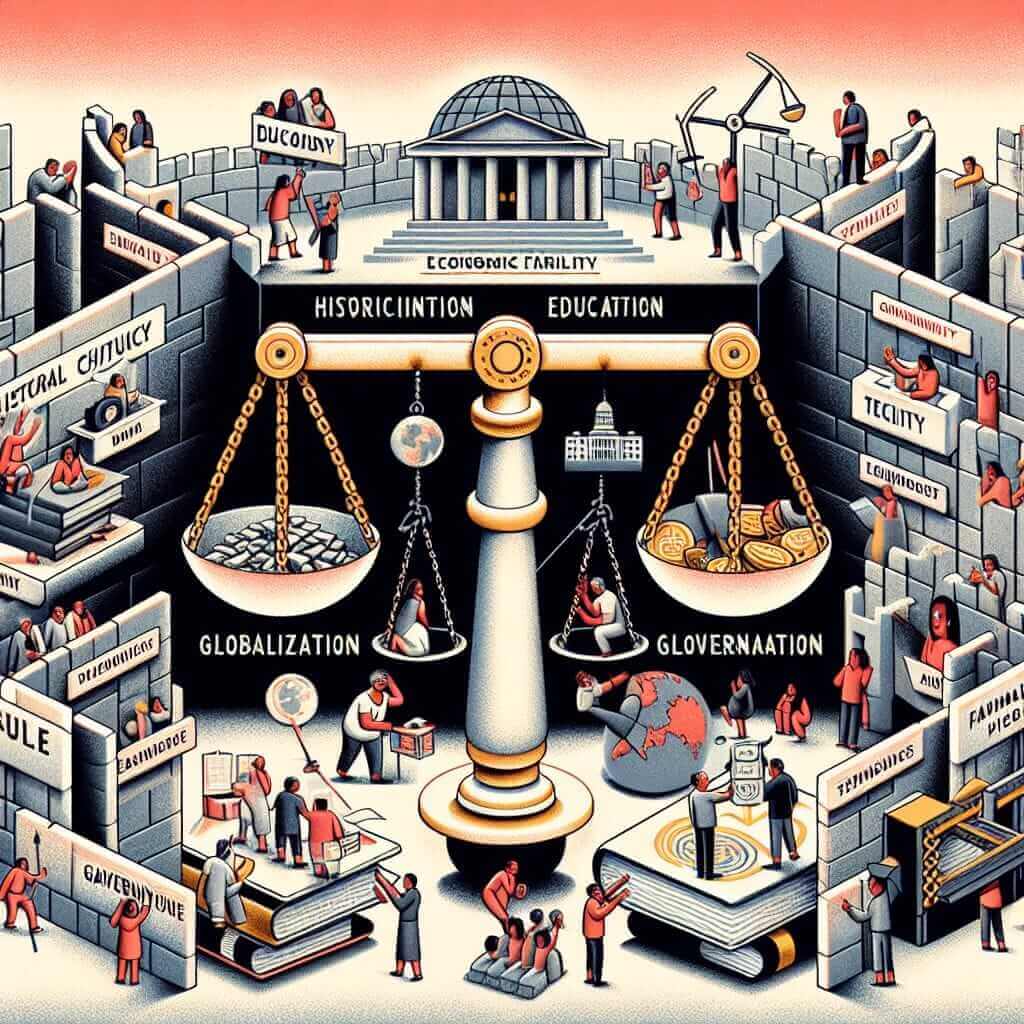The IELTS Reading section is known for its challenging passages and tricky questions. One prevalent topic that has appeared in previous IELTS exams is the “Challenges in achieving economic equality.” This subject is highly relevant in today’s global context and might appear in future exams. Understanding the topic and practicing with similar passages can significantly improve your chances of scoring high in the Reading section.
Reading Passage: Challenges in Achieving Economic Equality
Passage
Economic equality remains an elusive goal despite various interventions and policy initiatives. Different countries exhibit varying levels of economic disparity, with a complex interplay of factors contributing to this inequality.
Firstly, historical context plays a crucial role. Nations with colonial pasts often struggle with entrenched economic inequalities. For example, many African countries face significant disparities rooted in colonial exploitation and subsequent underdevelopment.
Secondly, educational opportunities are unevenly distributed, significantly affecting economic equality. Those with access to quality education tend to secure better-paying jobs, perpetuating the cycle of wealth among a privileged few.
Thirdly, gender inequality also poses a significant challenge. In many societies, women are systematically denied equal opportunities in education and employment, exacerbating economic disparities.
Moreover, technological advancements, while driving economic growth, can also widen the gap between the rich and the poor. The digital divide means that those without access to technology and the internet are left behind.
Globalization has been both a boon and a bane. While it has lifted millions out of poverty, it has also increased economic inequalities within and between countries due to uneven benefits and exploitation of labor in developing countries.
Lastly, political decisions and governance affect economic equality. Corruption, lack of transparency, and ineffective policies can result in skewed economic opportunities, further stratifying society.
In conclusion, achieving economic equality requires a multifaceted approach, addressing historical injustices, improving educational access, fostering gender equality, bridging the digital divide, balancing the impacts of globalization, and ensuring good governance.

IELTS Reading Practice Questions
Questions 1-5: True/False/Not Given
- Historical context plays a minor role in economic inequality.
- Educational opportunities are distributed evenly across the globe.
- Gender inequality can exacerbate economic disparities.
- Technological advancements always help in reducing economic inequality.
- Effective governance is crucial for achieving economic equality.
Questions 6-9: Matching Information
Match the following information to the correct statement:
- A. Technological advancements
- B. Historical context
- C. Gender inequality
- D. Globalization
- __ often results in a digital divide.
- __ leads to unequal opportunities for women.
- __ plays a crucial role in economic inequality due to colonial exploitation.
- __ has both positive and negative impacts on economic equality.
Questions 10-13: Short-answer Questions
- What factor contributes significantly to economic inequality due to past exploitations?
- Who tends to secure better-paying jobs due to access to quality education?
- What is required to bridge the digital divide?
- What two conflicting impacts does globalization have on economic equality?
Answer Keys and Explanations
True/False/Not Given Answers
- False – Historical context plays a major role.
- False – Educational opportunities are unevenly distributed.
- True – Gender inequality exacerbates economic disparities.
- False – Technological advancements can widen the gap.
- True – Effective governance is crucial.
Matching Information Answers
- A – Technological advancements often result in a digital divide.
- C – Gender inequality leads to unequal opportunities for women.
- B – Historical context plays a crucial role due to colonial exploitation.
- D – Globalization has both positive and negative impacts on economic equality.
Short-answer Questions Answers
- Historical context.
- Those with access to quality education.
- Bridging the digital divide requires addressing technological access disparities.
- Globalization lifts people out of poverty but increases inequality.
Common Mistakes to Avoid
- Ignoring Keywords: Pay close attention to keywords and phrases in the passage and questions.
- Misinterpreting Questions: Ensure you fully understand the question type before answering.
- Skimming Too Quickly: While skimming is important, don’t go too fast, or you might miss crucial details.
Vocabulary
- Colonial exploitation (n): /kəˈləʊniəl ɪkˌsplɔɪˈteɪʃən/ – The unfair use of a colonized country’s resources.
- Digital divide (n): /ˈdɪdʒɪtl dɪˈvaɪd/ – The gap between those with access to technology and the internet and those without.
- Governance (n): /ˈɡʌvərnəns/ – The action or manner of governing a state, organization, etc.
Grammar Focus: Complex Sentences
Complex sentences are crucial for academic writing in IELTS. They help convey detailed information and show a good command of the language.
Example
Sentence: “Although technological advancements drive economic growth, they can also widen the gap between the rich and the poor.”
- Although: Subordinating conjunction
- Main clause: “they can also widen the gap.”
- Subordinate clause: “Although technological advancements drive economic growth”
Tips for High IELTS Reading Scores
- Practice Regularly: Engage in daily reading practices using diverse materials.
- Expand Your Vocabulary: Regularly learn and revise new words.
- Understand Question Types: Familiarize yourself with different question formats and practice accordingly.
- Time Management: Develop good time management to allocate sufficient time for each passage.
By understanding these core aspects, you can effectively prepare for the IELTS Reading section and tackle challenging topics like economic equality with greater confidence and skill.
For related topics, you may find these articles helpful:
- Challenges in achieving social equity
- Challenges in achieving economic sustainability
- Role of women in economic development
Good luck with your IELTS preparation!